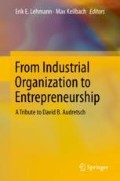Abstract
This short paper highlights selected achievements of David B. Audretsch, outlines the special role David played in shaping our academic careers and introduces a simple behavioral model of stochastic knowledge accumulation with a link to David’s work. Compared to the rational economy, this model assumes that behavioral agents do not fully acknowledge a change of the knowledge production due to aggregated knowledge stock changes. One explanation for this behavior is that behavioral agents cognitively discount future events more, the more distant such events are in the future.
Access this chapter
Tax calculation will be finalised at checkout
Purchases are for personal use only
Notes
- 1.
For simplicity, we assume that δ > ξ. Saying this, we know that the derived results below crucially depend on this assumption.
- 2.
We assume that all rational (behavioral) firms are symmetric.
References
Åstebro, T., Herz, H., Nanda, R., & Weber, R. A. (2014). Seeking the roots of entrepreneurship: Insights from behavioral economics. Journal of Economic Perspectives, 28(3), 49–70.
Audretsch, D. B., & Keilbach, M. C. (2008). Resolving the knowledge paradox: Knowledge-spillover entrepreneurship and economic growth. Research Policy, 37(10), 1697–1705.
Audretsch, D. B., Keilbach, M. C., & Lehmann, E. E. (2006). Entrepreneurship and economic growth. Oxford/Toronto: Oxford University Press.
Coibon, O., & Gorodnichenko, Y. (2015). Information rigidity and the expectations formation process: A simple framework and new facts. The American Economic Review, 105(8), 2644–2678.
Gabaix, X. (2016). Behavioral macroeconomics via sparse dynamic programming. NBER Working Paper No. 21848.
Gabaix, X., & Laibson, D. (2017). Myopia and discounting. NBER Working Paper No. 23254.
Hall, R. E., & Woodward, S. E. (2010). The burden of the nondiversifiable risk of entrepreneurship. American Economic Review, 100(3), 1163–1194.
Moore, D. A., & Healy, P. J. (2008). The trouble with overconfidence. Psychological Review, 115(2), 502–517.
Shane, S. (2008). Fool’s gold?: The truth behind angel investing in America. Oxford: Oxford University Press.
Author information
Authors and Affiliations
Corresponding author
Editor information
Editors and Affiliations
Rights and permissions
Copyright information
© 2019 Springer Nature Switzerland AG
About this chapter
Cite this chapter
Klarl, T., Menter, M. (2019). A Simple Behavioral Model of Stochastic Knowledge Accumulation. In: Lehmann, E., Keilbach, M. (eds) From Industrial Organization to Entrepreneurship. Springer, Cham. https://doi.org/10.1007/978-3-030-25237-3_45
Download citation
DOI: https://doi.org/10.1007/978-3-030-25237-3_45
Published:
Publisher Name: Springer, Cham
Print ISBN: 978-3-030-25236-6
Online ISBN: 978-3-030-25237-3
eBook Packages: Economics and FinanceEconomics and Finance (R0)

